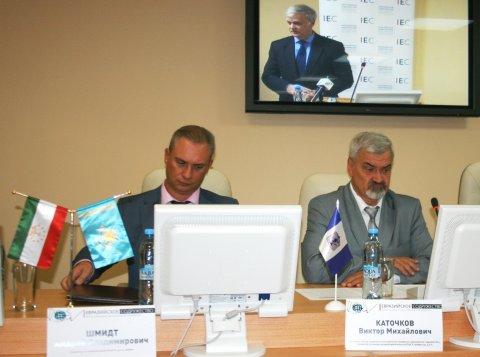International conference “The Future of the Eurasian Space” was held on September 8th at South Ural State University. The government of Chelyabinsk Oblast, Fund for Socio-economic Development “Eurasian Community”, South Ural State University, and the M. Osimi Tajik Technical University participated as organizers of the event.
Experts from Russia, Tajikistan, Kazakhstan, and representatives of expatriates of the Central Asian region in the South Urals and in the Khanty-Mansisk autonomous region participated in the international conference.
Participants of the round table were greeted by SUSU pro-rector, doctor of economic sciences, Andrey Shmidt. Andrey Vladimirovich noted that discussions today center around political, legal, economic, and humanitarian aspects of further integration of states in the national structure of the Eurasian Economic Union with common goals, the tasks and common issues of their development and increasing their competitiveness.
“This block of questions is gaining more importance, since it is necessary to search out effective mechanisms for economic growth in the period of post-crisis development and in the conditions of new possible challenges,” said Andrey Schmidt.
The first vice president of the South Ural Chamber of Commerce, Igor Aristov, greeting participants of the conference, acknowledged the growing role of international and national political, economic, and cultural integration in development. At this time in the modern world new economic institutes are forming and developing and their role in increasing the competitiveness of national economies is growing. Igor Vycheslavovich noted the necessity of simplifying the procedures for the partnership of business communities within the Eurasian Economic Union.
In his presentation, president of the “Eurasian Community” fund, Viktor Katochkov, took a moment to speak about the issues of globalization and prospects of integration in the Eurasian space.
“Formation of an integrated Eurasian space in the current landscape can prove to be an effective means of defense and the adjustment of every country in the Eurasian space to the modern, international economic structure,” summarized Viktor Mikhailovich.
Of great interest was the presentation of “Sever-Yug” Politological Center expert Anna Vlasova, who considered European integration through the prism of individual change.
Representative of the M. Osimi Tajik Technical University, Ramazon Abdulloyev, considering the entrance of Tajikistan into the EEU, noted the strategic advantages that come from integration. “First of all, life of Tajik labor migrants in Russia will improve, and they’ll have the chance to be employed in any of the EEU countries according to the principal of free labor movement. Tajikistan can become a leader in the production of cotton and can increase the production of the textile industry, which will lead to the creation of new jobs, an increase of the country’s GDP and citizens’ salary, and a reduction in the level of radicalization among local youth. One more plus for Tajikistan is an influx of investments from EEU countries, in part, hydro energy and in the banking sphere”
Fund expert, doctor of economic sciences, Yulia Kuzmenko, brought up the prospects for partnership in the educational sphere. Yulia Gennadyevna noted that thanks to the use of contacts between institutions of higher education, new networks for research experts of various types have been founded, joined by the Russian language and a desire to enable the strengthening of close, friendly ties. In many cities in the Eurasian space, contact has been made with expert communities, which, in the near future, need to strengthened and made more developed, established, and wide-spread. Once more the necessity of forming a unified academy of sciences for EEU states was noted. “The development of the scientific component can give a strong impulse to the economies of states of Eurasian integration, deliver them to a new level in world geopolitics. With this in mind, it becomes important to save the infrastructures and best traditions of EEU states and develop new fundamental and applied research projects and combined work of research collectives and individual researchers.”
In her presentation, fund expert and representative of Nizhnevartovsk, candidate of legal sciences Nina Semeryanova noted that Nizhnevartovsk is a multinational city. Each nation is its own culture, traditions, and mentality. And an expatriate community is a possibility to unify people of one soul and of one nation in the northern city, the capital of oil pools. National minorities enrich our societies with various elements of their own ethnic culture, study traditions of the society they are tying their future lives with. All of this enables mutual, individual and national enrichment, the appearance of an ethnocultural pluralism, and friendship between all of the nationalities in the territory of KhMAO. Burkhon Sharopov, head of the Sogdian Tajik National-Cultural Center in Nizhnevartosk noted that the main idea of our unification is to save and spread the cultural traditions of the Tajik people and to offer social, legal, and other forms of help to those who find themselves in difficult life situations. With this in mind, the work of our organization is focused on providing help to newly-arriving Tajik emigrants to the city of Nizhnevartovsk in regard to their living, registration, and employment, help with social security, the organization of Russian language courses and other events for them.
At the end of the round table’s work, a resolution was passed.





